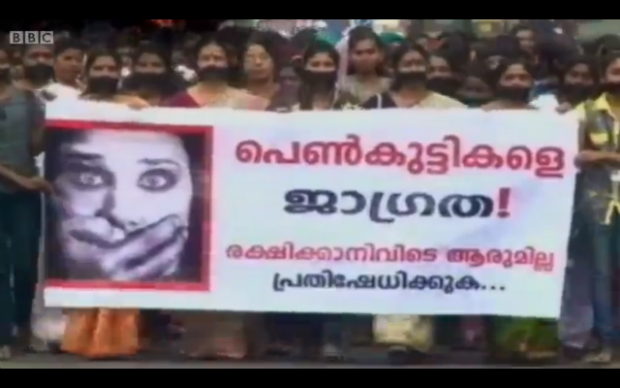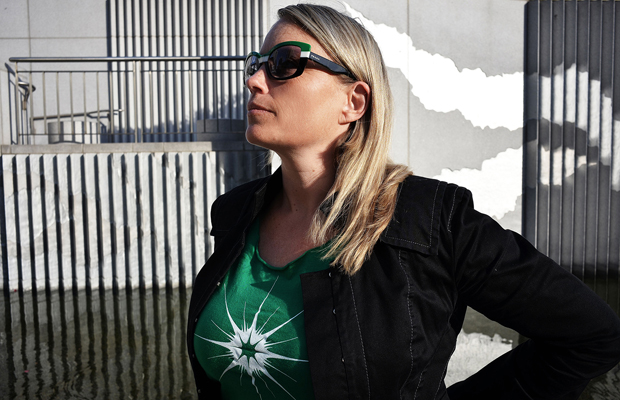12 Mar 2015 | mobile, News and features, Volume 44.01 Spring 2015

Tim Cross and Martha Lane Fox, credit: Mark Boardman
Martha Lane Fox and retired Major General Tim Cross debate how far governments go when balancing individual rights and safeguarding the nation. This is an extract from a longer feature in the latest issue of Index on Censorship magazine.
Martha Lane Fox
When it comes to balancing national security and personal privacy, I believe that your personal data should be your personal data, and that action should be taken based on a case that can be proven, as opposed to looking at everyone in society’s movements and then targeting those who stand out. I am not a fan of the world we seem to be ending up in, and I don’t necessarily believe that it is because of anything malicious. I think it would be better to have a system where your data is your personal property, and there then have to be the same restrictions applied as would be the case if someone wanted to enter your home and go through your belongings or intercept your post.
Tim Cross
Like fighting terrorism, governments have to “fight” with one hand tied behind their backs, but they cannot fight with both hands tied as some would clearly prefer. Individuals will understandably not want governments interfering with, or prying into, their personal privacy, but no one will thank any government if the banking system or consumer supply chains were to collapse. Monitoring cyberspace now forms a key part of any government responsibilities, and is (or should be) included in any national security strategy.
This said, if people fear the state is holding too much data on them unnecessarily and (rightly) demand some semblance of control over what happens with that data, then government is the least of their worries. Leaving aside the fact that government resources are scarce, the idea that some government employee is sitting in a room somewhere carefully sifting through everyone’s email is fanciful. Intelligence and law enforcement have to meet certain criteria including necessity, proportionality and justification. This is absolutely the way it should be. But private firms have no such restrictions in place. Government intelligence and law enforcement agencies are rightly burdened by layers of legality, including authorisations, justifications and audit trails, but big corporations, particularly those whose primary public interface is through cyber means, use and exploit personal details for a wide variety of reasons. While these may sometimes include improving their services, more unpalatably they sell details on to third parties. This is absolutely endemic. Many companies will not allow customers to use their service unless they agree to terms and conditions that essentially mean losing control of their personal details and allowing them to be sold on to the highest bidders. The primary concern of business is making money. Not so with governments, whose intelligence and law enforcement agencies are about deterring/catching enemies and protecting the public.
To read the rest of the debate, click here to subscribe to Index on Censorship magazine. Or buy an individual issue. Or subscribe to the app (free 30-day trial).
Major General (Rtd) Tim Cross (CBE) was commissioned into the British Army in 1971.
He served in Northern Ireland, Macedonia, Albania and Kosovo. He was also the British deputy to the US-led Office of Reconstruction and Humanitarian Affairs, later re-titled the Coalition Provisional Authority. He is chair of the think-tank Theos
Martha Lane Fox is chair of Go On UK, a digital skills charity which helps people to get online. She co-founded travel website lastminute.com, and in 2013 became a crossbench peer in the House of Lords
12 Mar 2015 | India, News and features

A scene from the recently released documentary India’s Daughter (Image: BBC)
Whoever, intending to insult the modesty of any woman, utters any word, makes any sound or gesture, or exhibits any object, intending that such word or sound shall be heard, or that such gesture or object shall be seen, by such woman, or intrudes upon the privacy of such woman, shall be punished with simple imprisonment for a term which may extend to one year, or with fine, or with both.
– Section 509, Indian Penal Code
“The lady…or the girl, or woman, is more precious than a gem, a diamond. It is up to you how you want to keep that diamond in your hand.”
“Someone put his hand inside her and pulled out something long. It was her intestines.”
“My husband told me I was stupid because I went to protest and didn’t think about the consequences”
– From the documentary India’s Daughter
The rape and murder of Jyoti Singh on a bus in Delhi in December horrified much of India and the world. Rape is by definition an act of violence and violation, but the details of the brutality meted out by the gang of six attackers were particularly shocking. Singh was flown to a specialist hospital in Singapore, but eventually succumbed to her injuries.
The 23-year old had been returning home from a trip to the cinema to see The Life Of Pi with a male friend. Of course, in discussions of rape, it does not matter what the victim was doing; where the victim was going, or when, or why or with whom. But it was extraordinary how the “asking for it” argument was extended in the prosecution of Singh’s killers.
Watching the BBC’s stunning India’s Daughter documentary was a disturbing experience. Singh had not gone out alone, it was true. She had not gone to a bad part of town: but she had gone out in the evening, with a man who was not a family member. That was enough.
She was female in public. That was enough to justify the attack. One attacker spoke of taking “pleasure” where you found it: the rich man will pay for his “pleasure”, the poor man will attain it “through courage” — that is, rape.
India’s Daughter was a shocking, grim and important hour of television that laid the misogyny of society bare for all to see. All, that is, except Indian BBC viewers, who were denied the opportunity to watch the documentary.
The Indian government obtained an injunction barring the film being shown in the country after it emerged the filmmakers had interviewed one of the rapists, Mukesh Singh. The attacker was apparently unrepentant, repeating the mantra that a “good girl” would not have got herself into the situation where he raped her.
Indian Home Minister Rajnath Singh was appalled, saying: “It was noticed the documentary film depicts the comments of the convict which are highly derogatory and are an affront to the dignity of women.” The government invoked section 509 of the Indian penal code
So the film was banned from television. And then later from YouTube in India. An hour of forensic, challenging film-making, exploring violence against women and the attitudes around violence against women was censored in order to protect women’s honour — a woman’s “honour” being patriarchy’s most precious bauble. Indian society had failed to protect Jiyoti Singh in life and now, still, she, through her story, was to be denied access to public space in death. This is not how we “protect” women.
It is not the job of society to “protect” women: rather it is the job of society to ensure women’s rights. This is not done by keeping quiet, or suggesting that women keep quiet, but rather by talking loud and clear.
This week, Naz Shah, the Labour parliamentary candidate for Bradford West (where she will challenge George Galloway) became an instant star after an article about her life and what had driven her to seek political office. Her mother had been brutalised for years. Shah’s father had run off with another woman, and her mother sought shelter for herself and her children with another man. But she found torture, not sanctuary. After years of abuse, Shah’s mother killed her tormentor. Following campaigning work from the ever-inspirational Southall Black Sisters, Shah’s mother Zoora saw her jail sentence for the killing reduced from 20 years to 12.
Borrowing a phrase from Barack Obama, Shah described how her political ambition had stemmed from the “dream of her mother”. After Shah’s father left, it was the mother, the innocent party, who was left with the shame, the besmirched honour. While in prison, Zoora Shah told her daughter that she would like to see her become a prison governor, so that she could help women in incarceration. Shah’s impulse ever since, she says, was to be in a position to influence change.
But still she realises there will be people who are not interested in women taking up public spaces. “Already my ‘character’ has been attacked and desecrated through social media and trolling. The smear campaign that has started has been some of the most vicious and disgusting I have seen. But it does not scare me, will not change me, and it in fact fuels my passion for change more,” she wrote for Urban Echo.
The impulse to deny women the right to exist in public is not limited to the streets of Delhi, or Bradford. Think of the threats received by feminist Caroline Criado Perez, by MPs such as Stella Creasy and Luciana Berger. Think, even of the sexist chants against female officials and staff that have been highlighted by the Football Association recently. The language may be openly hateful, or couched in “protective” metaphor, but the message is always clear. The public sphere, public interaction, is for men, and at best, you are here by our permission. But the question is not, fundamentally, about who grants permission. As long as we accept that that power belong to one group and not the other, then we are accepting and entrenching inequality. The aspiration is to smash any idea of who is “allowed” to go where, who is allowed to wear what, who is allowed to say what. In an equal world, there can be no concept of “permission” being granted by one group to another. Instead, as Naz Shah wrote, there must be “real meaningful and honest conversations not only with ourselves but with our families, our communities and beyond”.
This column was posted on 12 March 2015 at indexoncensorship.org
12 Mar 2015 | Awards, Digital Freedom, mobile, News and features, United States

Digital activism nominee Nico Sell
Nico Sell is a US-based entrepreneur and activist for online privacy and secure digital communication. Sell is the CEO of Wickr, a private messaging app with watertight encryption technology. Messages sent using the app self-destruct after a length of time adjusted by the sender – from six days to one second – and are then overwritten by gibberish data on the sender’s and receiver’s phones, making them impossible to recreate.
“Wickr is a messaging app that allows you to send pictures, videos and files, but the only difference is that only you have the keys, so we don’t see who any of our users are, or what they are sending. We are essentially just a transports of gibberish, and it’s used by a lot of human rights fighters around the world for those reasons”, Sell told Index on Censorship.
Wickr’s secure encryption and lack of a central database distinguishes it from similar apps such as Snapchat, which was hacked in January 2014 and had its users’ details posted online. After the breach, downloads of Wickr increased by 50 per cent.
Files leaked by Edward Snowden in 2013 revealed the extent to which the US National Security Agency had covertly retrieved users’ personal data from Microsoft, Facebook, Google and others. Many other countries were also shown to be extracting information from tech companies: the Venezuelan government, for example, has been accused of broadcasting human rights activists’ Skype calls on national television to intimidate them.
But Wickr was designed to run without a master key that could decrypt its users’ messages, which means it has no user information to hand over to the authorities if they demand it. Indeed, in early 2014 Sell rebuffed an FBI agent who informally requested that she implement a backdoor into Wickr, so that its data could be acquired if necessary.
Wickr has been downloaded more than three million times since launching in 2012. Since then it has added secure photo- and video-sending features. In December 2014 it was launched in desktop form. Sell hopes that billions of people will eventually use either Wickr or services incorporating it, and envisions its technology being used for “all the financial transactions in the world”.
Sell has also acted as a venture catalyst for more than 20 successful digital security companies and has co-organised Defcon, the largest hacker conference in the world, for over a decade. She is the group’s liaison with federal agencies seeking the services of white-hat hackers, who probe organisations’ websites for flaws in their security systems.
Sell told Index that she got involved with this field of work when was introduced to The Dark Tangent, founder of Defcon, about 15 years ago. She began working with him, and was “educated by the very best hackers in the world.”
“That’s where they taught me things like why lawful intercepts is something we don’t want to do, because if you can break into it, what that means is a backdoor for the good guys will always mean a backdoor for the bad guys,” she said.
“I think security and privacy naturally go in hand together, but I think just understanding the underlying technology and what’s going on making privacy obvious.”
Every year at Defcon, Sell runs a nonprofit training camp for children and teenagers called R00tz Asylum, which she is also CEO and co-founder of, in which digital skills such as white-hat hacking techniques are taught.
“So we teach them things like how to eavesdrop on cell phone calls, look at other people’s text messages that are going over the wireless network, turning on your interfacing camera on your computer or smartphone or smartTV, and how to break into lawful intercept machines,” Sell said. She added that the point of this, is that people need to understand hacks so that better systems can be built.
Sell raises awareness of the need for individuals to take more care over their digital privacy through frequent public engagement talks. At these talks, she hands out stickers for her audience to place over all their front-facing cameras. She also explains why she always wears sunglasses in public – to block facial recognition software – and keeps her phone and passport in an unhackable Faraday cage.
When asked about the relationship between online privacy and freedom of expression, Sell said:
“I think it’s vitally important. 52 per cent of the world still lives under dictatorship, and I think that what brought my founders together is that there was the belief that private correspondence is a universal human right, and in fact, the most important human right that we have for the next decade as we’re bringing all of these billions of people online and having a way for them to have private conversations without interference from government, or even a bigger threat, is corporations who are buying and selling this information.
“It’s our belief that if we can provide this vital right to everyone no matter our frontier, then we can have more evolution instead of revolution, because you don’t get pent up energy and people backed in a corner if there is open communication and education. So we think it’s vitally important in society as we all get connected over the next decade.”
This article was posted on 12 March 2015 at indexoncensorship.org



